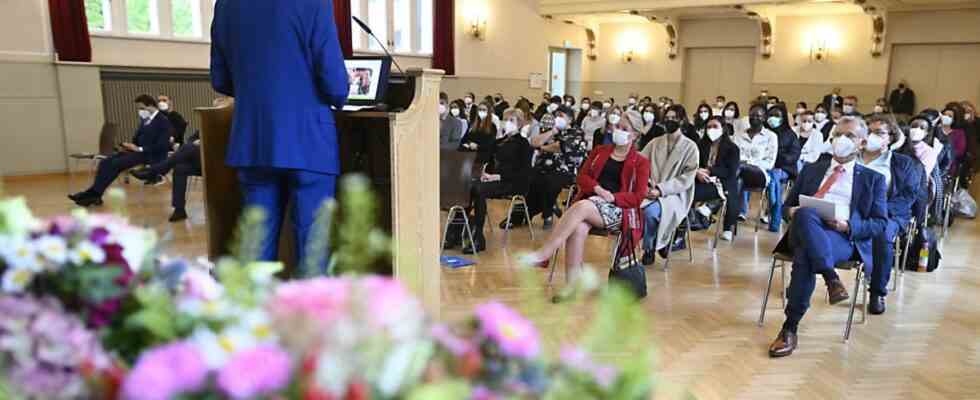It usually begins with a sudden fever, headache, and cough, which often progresses to pneumonia. Countless patients do not survive the disease, dying a few days after the onset. This description inevitably reminds you of the past two and a half years, during which the corona pandemic kept the world in suspense. But the typical course of the disease is also that of the Spanish flu, which raged around 100 years earlier. Between 1918 and 1920 it claimed millions of victims worldwide. Then as now, given the crisis, attention was drawn to the central importance of nursing.
In order to meet the recognized need for well-trained nursing staff, the vocational school for nursing was founded in Haar in 1922, which still exists today. District President Josef Mederer described the long tradition of the facility as an “extraordinary success story” at the ceremony marking its 100th anniversary.
District President Josef Mederer speaks of an “extraordinary success story”.
(Photo: Claus Schunk)
Old black-and-white images of nurses in light-colored scrubs flicker across the screen behind the lectern. Back then, when the school was founded, the classes were very small, each with only ten to 15 students, as the current head, Viktoria Lehrer, explains. The training in nursing was also not very professional: up until the beginning of the 20th century, doctors, pastors and superiors were responsible for this – most of them had no pedagogical experience. The courses only lasted a few weeks, so the knowledge imparted was not particularly in-depth.
Because the demands that society made on nursing were fundamentally different from today’s ideas: A personal relationship with the patient was not desired, and conversations were sometimes even forbidden. Individual care was practically impossible – rather, patients were housed in large dormitories. Today, on the other hand, people know about the enormous importance of direct contact with the people being cared for and have recognized that only professional training can produce good carers.
The term “nurse” is obsolete
The term “nurse” has not been on the graduates’ certificates for a long time, and there are now many different paths into the profession: in addition to generalist training, the school in Haar offers general training, which since 2020 has included the areas of nursing, nursing and nursing Pediatric nursing connects, also a one-year training as a nursing assistant. About a year ago, an offer in remedial care started. According to the headmistress teacher, a total of almost 280 students are currently attending the facility.
Headmistress Viktoria Lehrer has implemented many innovations at her facility despite the stressful pandemic.
(Photo: Claus Schunk)
The biographies of the 24 teachers are just as varied as the range of training courses, because there is no single route to becoming a trainer in the nursing sector. “For a long time there was no talk of studying for teachers in vocational schools for nursing,” reports Lehrer. Over the years, however, various academic opportunities have emerged, such as a degree in Nursing Education, which some of the Haar teachers have completed. Others have completed training to become teachers of nursing professions. In addition, many specialist lecturers, including doctors and pharmacists, teach in Haar. As teacher says, this diversity is enriching for everyday school life: “It makes teaching much more interesting and lively.”
The headmistress was able to overcome major challenges with her team, she reports. Only two years ago, generalized training was introduced with a reform; Within a very short time, the new content had to be incorporated into the curriculum and timetables – all in addition to ongoing teaching.
Nursing Director Brigitta Wermuth is urgently dependent on the offspring.
(Photo: Claus Schunk)
The central task of today’s care industry is to find young people, of that teacher is convinced. “There are actually fewer trainees, we can clearly feel that.” In her opinion, one reason for this is the public discussion about the high burden, which was particularly intense during the pandemic. They are already trying very hard to “win young people for this great job. But we will certainly have to advertise even more in the future”.
Because a job in nursing is definitely a job with a future, says the headmistress. Demographic change ultimately means that more and more old people have to be cared for. “Today, getting an education in healthcare is more important than ever.”

